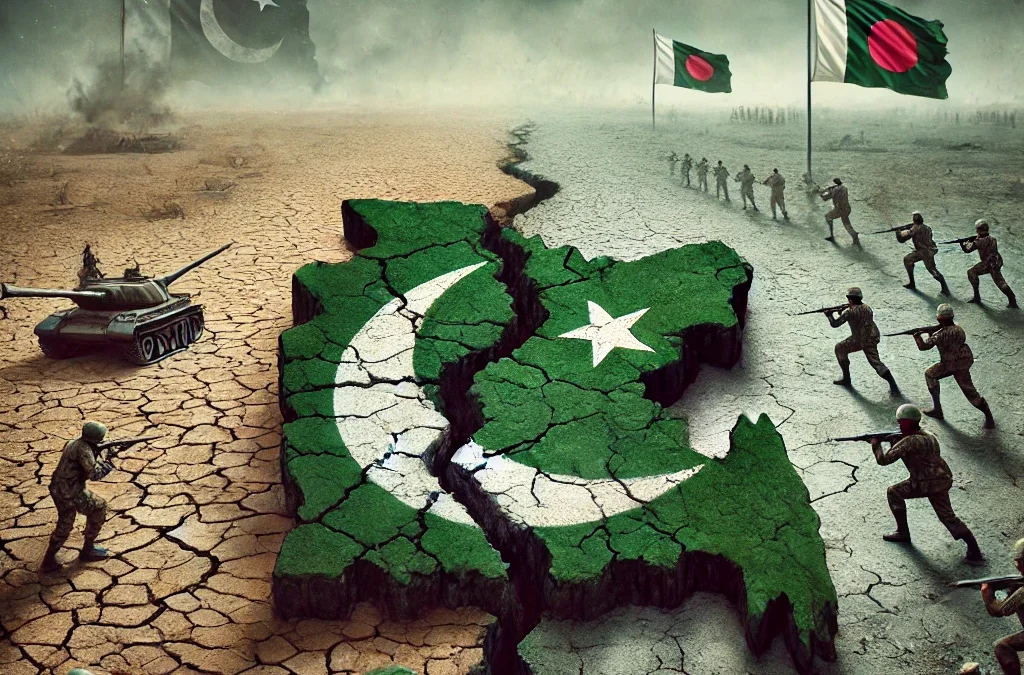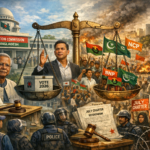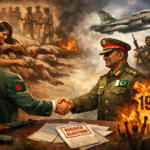The idea of a reunion between East and West Pakistan, long since separated by blood, betrayal, and an ocean of suffering, belongs squarely in fantasy. For decades, a handful of former Pakistani military officers, some of whom surrendered in Bangladesh in 1971, have harboured a bizarre and preposterous obsession: a longing for the resurrection of a united Pakistan. These ageing ex-generals and colonels, now in their octogenarian years, served under the notorious figures of General Tikka Khan, Zulfiqar Ali Bhutto, and General Zia-ul-Haq. Their grotesque daydream of reunification with Bangladesh is rooted in a profound disconnect from the brutal history they helped to shape. The crimes against humanity committed during the Pakistan-Bangladesh conflict of 1971—the massacres, the rapes, the lootings—have left indelible scars on the hearts and minds of the Bengali people, scars that can never heal enough to entertain such a reunion.
In exploring the delusion of these former military officers, we must revisit the historical record, the bloodshed that led to the creation of Bangladesh, and the inescapable shame and humiliation suffered by the Pakistani military in their devastating defeat in 1971. This article will scrutinise the continued failure of Pakistan to offer an overdue apology for its role in the atrocities and how the delusions of these military figures only deepen the wound in the Bengali psyche.
Historical Context: The Partition and the Road to 1971
The roots of the 1971 tragedy lie in the creation of Pakistan itself in 1947 when British India was divided along religious lines into two nations: India and Pakistan. Pakistan was an improbable nation, comprising two wings separated by more than a thousand miles of Indian territory. West Pakistan (modern-day Pakistan) dominated the political and military landscape, while East Pakistan (modern-day Bangladesh) was treated as a distant colony, despite housing most of the population. The seeds of resentment were sown early, as economic exploitation and political disenfranchisement of the Bengalis in East Pakistan fostered a deep and abiding sense of injustice.
Key events exacerbated these divisions, most notably the Language Movement of 1952, where the imposition of Urdu as the national language met with fierce resistance in East Pakistan. The movement became a symbol of Bengali cultural and political identity. Throughout the 1950s and 1960s, this struggle for autonomy intensified, as economic disparities between the two wings grew ever starker. By the late 1960s, the political climate was ripe for a showdown, and the 1970 general election proved to be the flashpoint.
Under Sheikh Mujibur Rahman, the Awami League won a landslide victory in the 1970 election, capturing almost all the seats in East Pakistan and securing a majority in the national parliament. Yet, West Pakistan’s political and military leadership, unwilling to concede power to a Bengali-led government, embarked on a catastrophic course of repression. On 25 March 1971, the Pakistani military launched Operation Searchlight, an infamous military crackdown designed to quell Bengali dissent. It was the opening act in a nine-month war of liberation that would culminate in Bangladesh’s independence.
The Brutality of 1971: Crimes Against Humanity
Operation Searchlight was characterised by unspeakable brutality. It is estimated that between 300,000 and 3 million people were killed in the subsequent genocide, with a large number of these casualties being unarmed civilians. Women were systematically raped, with estimates ranging from 200,000 to 400,000 victims. Entire villages were burned to the ground, and mass graves dotted the landscape of East Pakistan.
The Pakistani military, under the command of General Tikka Khan—later dubbed the “Butcher of Bengal”—engaged in a campaign of terror designed to break the spirit of the Bengali population. It was not only the actions of the regular army that sowed terror; auxiliary forces such as the Razakars, Al-Badr, and Al-Shams—militias loyal to Pakistan—also perpetrated horrific crimes. They aimed to eliminate Bengali intellectuals, students, and other leaders who might support the independence movement.
These crimes against humanity committed by Pakistani forces, many of whom later served in senior military and political roles in Pakistan, remain a source of deep pain and trauma for the people of Bangladesh. The fact that these same individuals, who are directly or indirectly linked to the atrocities, now dream of a reunified Pakistan is nothing short of obscene.
The Humiliating Defeat and Surrender of 1971
The Pakistani military’s repression in East Pakistan did not go unchallenged. The Mukti Bahini, the Bengali guerrilla force, and India’s support launched a valiant resistance. By December 1971, the tide had turned irreversibly against the Pakistani military. On 16 December, after a swift and decisive Indian intervention, General A. A. K. Niazi, the commander of Pakistan’s Eastern Command, signed the Instrument of Surrender in Dhaka, marking the formal creation of Bangladesh.
The surrender of 93,000 Pakistani troops to Indian and Bangladeshi forces was one of the largest mass surrenders in modern military history. It was a humiliating defeat for Pakistan, and it shattered the myth of the invincibility of its military. Many of the officers who surrendered on that fateful day had previously served under Tikka Khan and would go on to play prominent roles in Pakistan’s military and political life.
The psychological impact of this defeat on the Pakistani military establishment cannot be overstated. For the senior officers involved, it was a personal and professional catastrophe. Yet, instead of reflecting on the moral and strategic failures that led to Pakistan’s disintegration, some of these officers have spent their remaining years clinging to the fantasy of reunification. In their twilight years, this delusion reflects an utter refusal to reckon with the reality of their actions and the consequences that followed.
The Delusion of Reunification: A Fool’s Paradise
The idea of a reunified Pakistan, with East Bengal once again under the control of Islamabad, is so far removed from reality that it borders on the absurd. The people of Bangladesh fought and died for their independence. The ocean of blood that was spilt in 1971 cannot be forgotten or forgiven, and any suggestion that Bangladesh would consider rejoining Pakistan is an insult to the memory of those who perished in the fight for freedom.
The ex-military officers who entertain this delusion live in a fool’s paradise. Their obsession with the past is not only misguided, but it also reveals a profound misunderstanding of South Asia’s political and cultural realities. Bangladesh has forged its path as an independent nation, and while it still faces challenges, it has no desire to return to the oppressive rule of Islamabad. The scars of the 1971 war are still fresh in the minds of the Bangladeshi people, and the resentment, hatred, and anger that linger from those dark days make any notion of reunification laughable.
These former officers, many of whom are now at the “fag end” of their lives, refuse to acknowledge the extent of the crimes committed in 1971. They fail to grasp the depth of the resentment harboured by the people of Bangladesh, who lost loved ones, saw their homes destroyed, and endured unimaginable suffering at the hands of the Pakistani military. For them, the thought of reuniting with Pakistan is not just unthinkable—it is a betrayal of the very principles of liberation for which they fought.
The Overdue Apology: Pakistan’s Moral Responsibility
One of the most glaring omissions in Pakistan’s historical narrative is its refusal to apologise for the atrocities committed during the 1971 war formally. Despite overwhelming evidence of war crimes and genocide, Pakistan has never fully acknowledged the extent of its culpability. The lack of an apology continues to create tension between the two nations.
Successive Pakistani governments have sidestepped the issue, perhaps fearing the political fallout of admitting to such heinous crimes. But without a formal apology, the wounds of 1971 can never heal. Bangladesh’s people still carry the trauma of those years, and until Pakistan takes responsibility for its actions, the scars will remain raw.
The ex-military officers who dream of reunification should instead focus on encouraging their government to offer a long-overdue apology. That would be the first step towards any reconciliation, though the idea of a political or territorial reunion would remain firmly in fantasy.
Conclusion: A Nation That Will Never Forget
The idea of reuniting East and West Pakistan is not only impractical—it is offensive to the memory of those who suffered and died in the creation of Bangladesh. The Pakistani military’s actions in 1971 left an indelible mark on the Bengali people, one that cannot be erased by the passage of time or the delusions of a few ageing ex-officers.
Bangladesh has moved on from the horrors of 1971, building a new nation out of the ashes of war. But the people of Bangladesh will never forget the crimes committed against them, and they will never allow Pakistan to come near their sovereign nation again. The ocean of blood that was spilled in the name of liberation has forever closed the door to any possibility of reunification. For those who still cling to this dream, it is time to wake up and confront the reality of their past actions and the irreversible consequences they have wrought.







I delight in, ressult in I found exactly what I wass having a look for.
You’ve ended my 4 day long hunt! God Bless you
man. Have a grat day. Bye https://Glassi-App.Blogspot.com/2025/08/how-to-download-glassi-casino-app-for.html
valley view casino center seating chart
References:
http://king-wifi.win//index.php?title=wieseepstein0893
casino review
References:
http://106.51.72.251:3000/claritayvd0883
video poker
References:
https://99link.me/kPPEf
spinpalace com
References:
https://git.bpcspace.com/brandideasey57
Schon die Schwarzweisseinleitung ist dermassen Jamesbond untypisch. Daniel Craig zeigt den typischen “Ich hab Muskeln, aber verhau mich nich”-Typen.Abgesehen davon dass er, wie ich finde, ziemlich bescheuert ausschaut, faengt der Film nie wirklich an. Wir hingegen schöpfen aus unserer literarischen und vor allem filmhistorischen Erinnerung. Zu sehr erinnert das private Liebesglück an das kurze Eheleben des Topagenten in Im Geheimdienst ihrer Majestät (On Her Majesty’s Secret Service, 1969). Beim letzten, dem Jubiläumsbond, war die Genderwelt noch in Ordnung.
Die ernsthafte Neuverfilmung machte die Parodie endgültig obsolet und verdrängte sie aus dem kollektiven Gedächtnis. Tatsächlich wurde Ian Flemings Debütroman über den britischen Geheimagenten bereits 1954 zum ersten Mal adaptiert – als Live-TV-Episode im Rahmen der US-Serie „Climax! Die allererste filmische Umsetzung von „Casino Royale“ hat mit dem eleganten und düsteren Reboot von 2006 mit Daniel Craig wenig gemeinsam. Martin Campbells »Casino Royale«, die neue Verfilmung des ersten Bond-Romans von Ian Fleming, ist in mancher Hinsicht ein Neustart, vor allem natürlich wegen der Wiedergeburt des James Bond in Gestalt von Daniel Craig.
References:
https://online-spielhallen.de/top-9-online-casinos-in-deutschland-2025/
Ein typisches Online-Casino ist eine Website, auf der man sogenannte Glücksspiele spielen kann. Das bedeutet, hier gibt es echte Profi-Slots, wie man sie aus dem Casino kennt und so viele Freispiele, wie Du willst. Somit spielen Sie anonym so lange Sie möchten und gehen keinerlei Risiko ein.
Wenn Du im Gratis Online-Casino spielst, kannst Du Dich beruhigt zurücklehnen und wahrscheinlich mehr tolle Spiele genießen, als im nächsten Casino in der Nähe. Du zockst im Online-Casino auch so lange anonym kostenlose Spiele, wie Du es für richtig hältst. Diese Spiele schützen dabei aber Dein Geld, denn kostenlose Spiele kosten natürlich nichts. Nutze die Gratis-Spiele und genieße kostenlose Casino-Spiele, solange Du Lust am Spielen hast.
References:
https://online-spielhallen.de/top-9-online-casinos-in-deutschland-2025-testsieger-boni/
Die Suche nach einem guten Online-Casino ist für deutsche Spieler nicht immer einfach. Staatlich geprüfte Online-Casinos erhalten somit nur eine Lizenz, wenn sie ihre Spieleplattformen ausschließlich an Kunden über 18 Jahren anbieten. Nur so kann man gewährleisten, dass der Glücksspielanbieter rechtens handelt und keinen Wert auf versteckte Klauseln legt.
Ja, einige deutsche Spieler senden uns ihre Feedbacks mit ihren persönlichen Online Casino Erfahrungen. Dennoch implementieren seriöse und https://online-spielhallen.de/beste-deutsche-online-casinos-11-2025-ehrlicher-test/ eine Vielzahl von Maßnahmen, um eine sichere Spielumgebung für ihre Nutzer zu gewährleisten. Es präsentiert eine umfassende Übersicht über die besten Online-Casinos für deutsche Spieler, mit verlässlichen Bewertungen und den neuesten Trends. Ganz gleich, ob du auf der Suche nach attraktiven Bonusangeboten, einer beeindruckenden Spielauswahl oder einem professionellen Kundenservice bist – wir haben alles, was du benötigst! Unser Team hat jedes Online Casino eingehend geprüft und bewertet, um dir eine solide Entscheidungsgrundlage zu bieten. Sie ermöglichen es dir, von exklusiven Angeboten und Aktionen zu profitieren und bieten Einblicke in wichtige Themen wie verantwortungsvolles Spielen, Spielerschutz und aktuelle Studien zur Spielsucht.
slots uk
References:
https://socialbookmarknew.win/story.php?title=top-online-casino-games-for-2025-play-win-real-money
orleans casino las vegas
References:
http://hslife.deegao.com.cn/home.php?mod=space&uid=691891
lucky play casino
References:
https://justbookmark.win/story.php?title=access-your-account-with-ease
prairie meadows casino
References:
https://www.orkhonschool.edu.mn/profile/osmanknlcopeland88815/profile
What i don’t realize is in fact how you’re now
not really much more neatly-preferred than you might be right now.
You are so intelligent. You realize therefore considerably in relation to this
topic, produced me in my view imagine it from numerous various angles.
Its like women and men don’t seem to be involved except it’s
something to accomplish with Lady gaga! Your individual
stuffs outstanding. Always maintain it up!